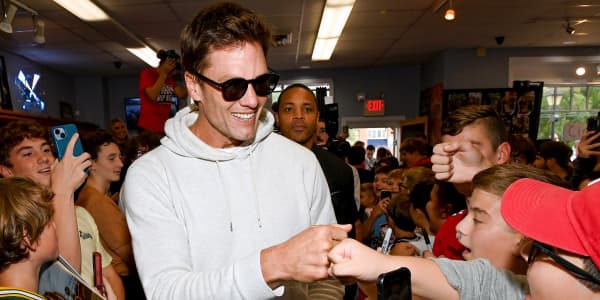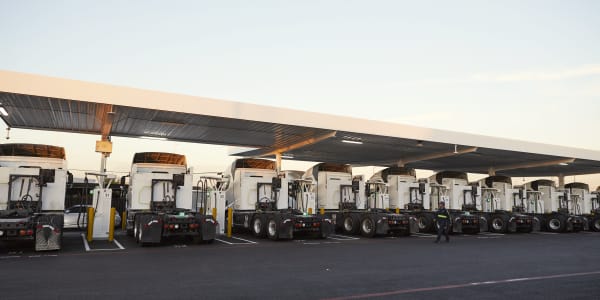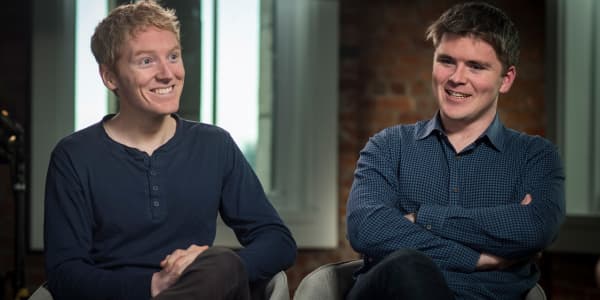Near the end of his stint running finance for Google, Julio Pekarovic noticed employees quietly stockpiling one particular type of bottled water from the company food pantries each day until the supply would run out.
"I called it Hint hoarding," he says, referring to Hint water, which infuses various flavors using only natural fruit oils. "You'd put a bunch under the desk for the morning and keep a few extras to drink in the afternoon."
Today, Pekarovic is a Hint investor and sits on the company board. He sums up the appeal of a product that has grown into a $90 million beverage sensation: "It's water, it's healthy, and I think it can be the Coca-Cola of our generation," he says.
Coke had played an unwitting role in inspiring the brand. In 2004 in San Francisco, Kara Goldin was a "new media" executive with three kids and another on the way when she vowed to kick her Diet Coke habit. Eager to lose weight and plagued by acne, Goldin started drinking water that she flavored with berries and slices of fruit. She lost 45 pounds in three months and saw her skin clear up. When she tried to find a similar water product in stores, it didn't exist, so she decided to make a prototype. The day Goldin gave birth to her fourth child, in 2015, the first Hint bottles appeared on shelves at a San Francisco Whole Foods.
"I never intended to be a beverage executive," says Goldin. "But I thought, if I wasn't going to come in and change things, no one else was. I'd been buying the lie that drinking diet soda is somehow healthier, but in fact, soda companies just want us addicted to sweeteners."
More from CNBC Disruptor 50:
Disney and other media giants are betting VR is the next big play in entertainment
A look inside Warby Parker's 'Optical Lab,' and a new eyeglass-making model
Meal delivery start-up Blue Apron files to go public
Goldin was six months into her business when she got another inadvertent boost — from Coke. Through a friend, she contacted a Coke executive she thought might help her scale Hint and expand beyond the San Francisco Bay Area. Goldin was midway through her spiel when the man interrupted and said, "Sweetie, Americans love sweet." That was exactly the nudge Goldin needed to build a brand that is now on shelves across the country in Whole Foods, Target, Wal-Mart and elsewhere.
"Hint arrived at a time when consumers were looking for more purity in foods and beverages and starting to notice what happens to a product before it hits your shelf," says Darren Seifer, a food-and-beverage industry analyst at NPD Group, a market research advisory. "The big watch-out is getting people to notice the brand in a very, very crowded field that's controlled by behemoths."
Ali Dibadj, a water industry analyst for Bernstein, says, "Hint has done very well along the health-and-wellness trajectory, but the difficulty in my mind is that it's a relatively replicable idea. Adding not much to water is easy to do, and the proof will be in whether Hint can buck that when others start to encroach."
People view Hint as a product that's true to its principles and part of an overall healthy lifestyle. There is no fear that, oh, one day we find out drinking purified water with fruit is unhealthy.Julio PekarovicHint investor and former Google executive
One solution is to avoid stores completely. Going online gives Hint unlimited "shelf space" and allows two-way engagement with customers who tend to see Hint as more than just another drink. Online sales represent almost 40 percent of Hint's overall business, Goldin says, who adds that offline growth was 200 percent last year over 2015. The company has raised $35 million over several rounds of funding from investors that include singer and brand ambassador John Legend, who discovered the Hint beverage at Whole Foods and Starbucks and then called the company to learn more about the founders and their mission.
"The sense of mission that Kara brings to her fight against sweeteners really connects with consumers and makes them seek it out specifically," Pekarovic says, who notes that Hint customers tend to drink multiple bottles a day. "People view Hint as a product that's true to its principles and part of an overall healthy lifestyle. There is no fear that, oh, one day we find out drinking purified water with fruit is unhealthy."
Even with 65 employees, Hint is stretching to meet consumer demand. The company recently added a sunscreen line that contains no parabens or oxybenzones (which have been linked to cancer). But according to Goldin, "the goal isn't to be the next Honest and have 5,000 products. Our plan is to bring essentials to the markets and disrupt categories we think are broken in cases where companies don't have the consumer's back."
For Goldin it comes down to healthy perception versus healthy reality. "When you have a billion-dollar advertising budget, you can get Taylor Swift to come and stand by your billboard and sell Diet Coke, but it's still not healthy," she says. "We're not interested in selling glitz. What we're doing is selling health."
— David Hochman, special to CNBC.com







